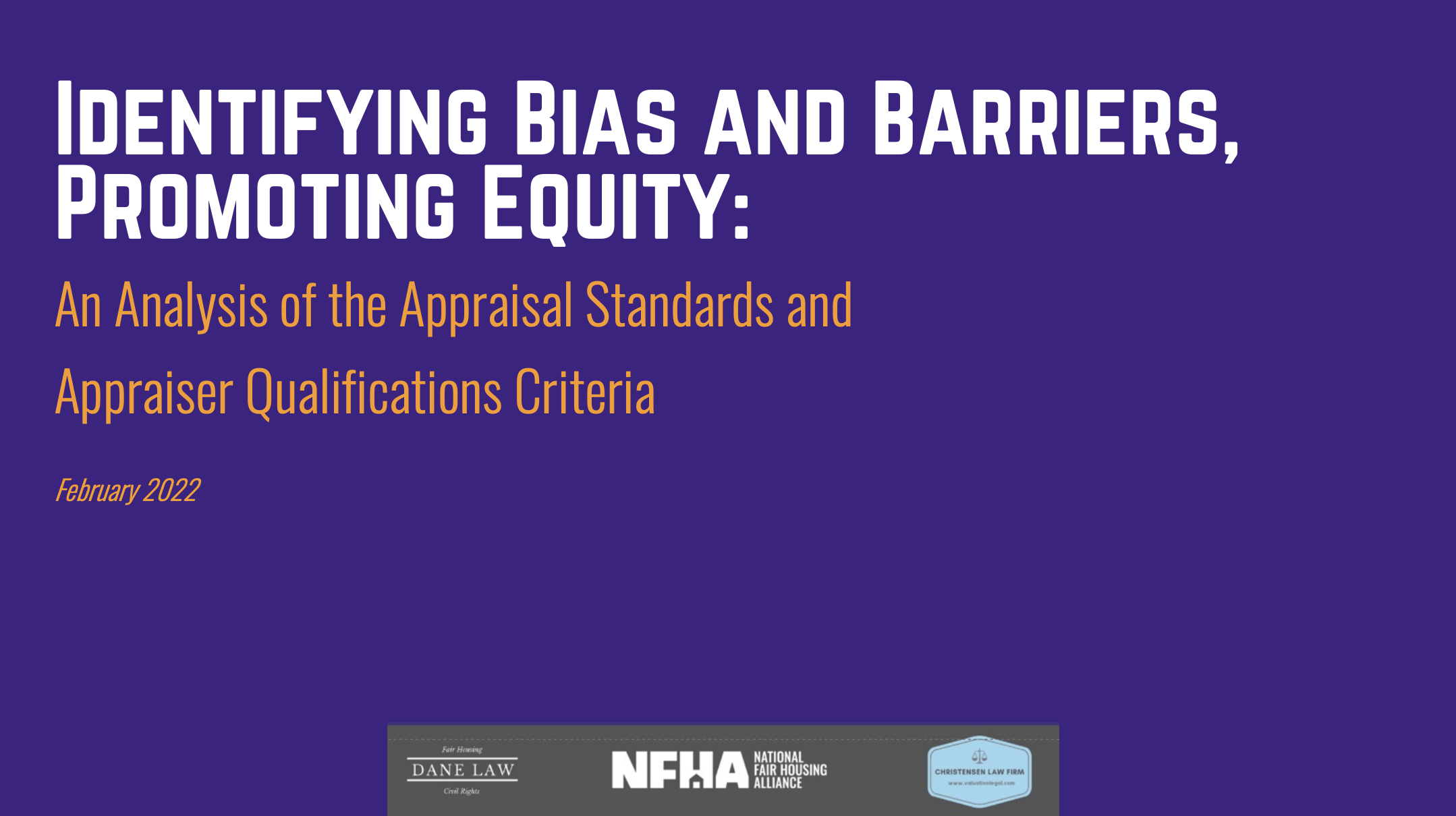Virtual Briefing: “Appraisal Standards and Appraiser Qualifications Criteria”
February 9th, 2022
On Wednesday, February 9, 2022, the authors of the groundbreaking new study on appraisal standards and appraiser criteria hosted a Virtual Briefing to discuss key elements of the report. Conducted by NFHA, Dane Law LLC, and the Christensen Law Firm (the “NFHA Consortium”), the “Appraisal Standards and Appraiser Criteria Report” (“Report”) is the most comprehensive review of the governance, structure, training, and industry standards to date. It presents a roadmap for Congress, regulators, advocates, lenders, and the appraisal industry to address the nation’s long legacy of bias in the valuation of real estate and build a future in which a family’s most valuable asset is treated fairly.
Based on the research and recommendations in the Report, we provide answers below to several of the questions raised during the briefing. We also want to acknowledge that the Report is a starting point for conversation among stakeholders seeking workable, sustainable solutions that benefit the whole of the housing market. There are many other areas for additional discussion and research. Several of the questions posed during the briefing note these areas for follow up, which we list below. The questions have been edited and condensed for clarity.
Presentation Slides
Q&A
A:
The NFHA Consortium briefed The Appraisal Foundation on the findings of the Report and provided an opportunity for discussion. At this point, The Appraisal Foundation has not provided a response to the NFHA Consortium directly or the general public, but has provided information to a reporter from HousingWire and to a public meeting of The Appraisal Foundation Advisory Council. NFHA provided a response to these comments, which can be found here.
In addition, the U.S. Department of Justice, Department of Housing and Urban Development, Federal Housing Financial Agency, Consumer Financial Protection Bureau, and the other federal financial regulators submitted a joint comment letter to The Appraisal Foundation’s Appraisal Standards Board asking for a “full presentation” of the fair lending laws in the appraisal standards. The Consumer Financial Protection Bureau also wrote an accompanying blog post strongly emphasizing that “appraisal discrimination is illegal under federal law” and raising concerns that The Appraisal Foundation has failed to include clear warnings about the requirements of federal law.
A:
The Financial Institutions Reform, Recovery, and Enforcement Act of 1989, as amended (“FIRREA”) only provides the following with respect to setting the appraisal standards:
Each Federal financial institutions regulatory agency and the Resolution Trust Corporation shall prescribe appropriate standards for the performance of real estate appraisals in connection with federally related transactions under the jurisdiction of each such agency or instrumentality. These rules shall require, at a minimum—
(1 ) that real estate appraisals be performed in accordance with generally accepted appraisal standards as evidenced by the appraisal standards promulgated by the Appraisal Standards Board of the Appraisal Foundation;
(2 ) that such appraisals shall be written appraisals; and
(3) that such appraisals shall be subject to appropriate review for compliance with the Uniform Standards of Professional Appraisal Practice.
Each such agency or instrumentality may require compliance with additional standards if it makes a determination in writing that such additional standards are required in order to properly carry out its statutory responsibilities.
12 U.S.C. § 3339. Thus, there is nothing in FIRREA that prevents The Appraisal Foundation from addressing the issue of discretion in the context of potential discrimination.
Appraisal discrimination is clearly prohibited under the federal Fair Housing Act and Equal Credit Opportunity Act and the federal financial regulators have long stated that discretion is one of the key risk factors that can lead to a violation of the Fair Housing Act or the Equal Credit Opportunity Act. See, e.g., the Interagency Fair Lending Examination Procedures (2009). For these reasons, the Report recommends: “Consistent with other aspects of the housing finance market, the appraisal process should be thoroughly reviewed for fair housing risk, particularly in the exercise of discretion, and the [appraisal standards] should be amended accordingly in order to provide a baseline standard for fair and equitable outcomes.” See Report at pages 52-56.
A:
The Appraisal Foundation does not provide a breakdown of the race and gender of its board members, or whether they are active appraisers. However, the list of board members and more information about the boards can be found here. In addition, information about how to participate in the public meetings of The Appraisal Foundation and its boards can be found here.
A:
Although the Report mainly focuses on the undervaluation of homes for consumers or neighborhoods of color, the Report also contains a brief discussion of the problem of overvaluation at page 25 of the Report. The main point is that the broad discretion in the appraisal process increases the risk of unfair undervaluations and overvaluations, both of which tend to disproportionately impact consumers of color. All stakeholders in the housing market would benefit from a fairer, more transparent, repeatable appraisal process that is grounded in data science.
A:
Yes, the NFHA Consortium interviewed appraisers of color, but they asked not to be identified. In addition, the Report provided quotes from Dr. Korver-Glenn’s interviews with appraisers of color. NFHA encourages all appraisers, including appraisers of color, to continue to be part of the efforts at appraisal reform.
A:
Dr. Korver-Glenn published the results of her interviews with appraisers and other housing professionals in Race Brokers: Housing Markets and Segregation in 21st Century Urban America, which was recently published in 2021. For a more detailed discussion of Dr. Korver-Glenn’s research, please see pages 21-24 of the Report.
A:
24 C.F.R. § 100.135(a): “It shall be unlawful for any person or other entity whose business includes engaging in the selling, brokering or appraising of residential real property to discriminate against any person in making available such services, or in the performance of such services, because of race, color, religion, sex, handicap, familial status, or national origin.”
24 C.F.R. § 100.135(d)(1): “Practices which are unlawful under this section include, but are not limited to…Using an appraisal of residential real property in connection with the sale, rental, or financing of any dwelling where the person knows or reasonably should know that the appraisal improperly takes into consideration race, color, religion, sex, handicap, familial status, or national origin.”
For a more detailed discussion of the civil rights laws and regulations (including cites), please see pages 27-33 of the Report. In addition, the U.S. Department of Justice recently filed a Statement of Interest in an appraisal discrimination case that explains that the Fair Housing Act applies to residential real estate appraisals and appraisers.

